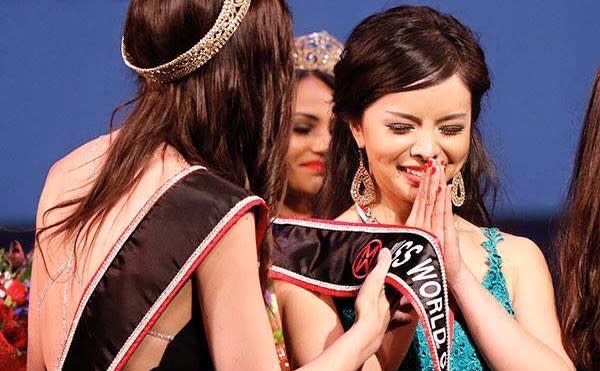 Canada Politics
Canada PoliticsQ&A with outspoken Miss World Canada on her China visa predicament

Miss World Canada 2015 Anastasia Lin is an outspoken activist on Chinese human rights issues, such as organ harvesting and the persecution of Falun Gong followers. However, the 25-year-old’s outspokenness may be the root of her current predicament; her native country has not yet issued her a visa required to participate in the Miss World competition, which takes place Dec. 19 in the city of Sanya.
The Toronto-based actress, who moved to Canada with her mother when she was 13, has starred in Canadian-made movies that centre on the issues she regularly protests against. In one film, for example, she plays a Falun Gong follower who faces torture in a Chinese labour camp. Her latest movie “The Bleeding Edge” is about organ harvesting and is expected to hit Canadian theatres soon.
Lin, who won the Miss World Canada title in May, is currently awaiting an invitation letter from the Sanya government, which is required for her to travel there to participate in the final pageant. While other competitors have reported stalls in their visas, everyone except Lin has since received them. She has until Nov. 20 to obtain the visa; otherwise Lin will be automatically disqualified from the pageant.
Q: Are you surprised your visa hasn’t been issued yet?
I expected this to happen. This is a tactic. It’s not just about me. It’s a pattern that the Chinese Communist Party uses the visa issue as leverage to silence individuals – intellectuals, journalists, academics outside of China. I have so many people saying, “You knew this was going to happen and now you have to face the consequences.”
But I don’t think that’s right. I don’t think we should accept this as something normal because it happens so many times and people just adapt to it. It doesn't mean it’s the right thing. It’s unhealthy and in the long term, it’s going to stifle voices. That’s not going to help anybody.
Q: What’s more important: being outspoken or participating the pageant?
Both, equally. The pageant will be broadcast in China, which will be interesting. They won’t be censoring the competition. They’re already promoting this as a state propaganda tool. If I get on there, for Chinese people to see my face, it will give them hope.
Q: How did you get started as an activist?
When I was in China I never heard of the news outside. After I came to Canada at 13, I started to read about China. My mother gave me information about certain persecuted groups. She wanted me to open up my mind and not only believe what I’d learned in China. I did my research into the persecution of Falun Gong, Tiananmen massacre, the Tibetan situation – these things are never heard of in China. I was really surprised that things could be so cruel and manipulative. I wanted to know the truth myself. When I lived in Vancouver, I spoke to (Falun Gong) protestors and their stories are really inspiring.
Q: What led you to pageantry?
At that time I didn’t really think about it. I was just attending events and listening to speeches. At one event outside the art gallery in Vancouver, (former Miss World Canada) Nazanin Afshin-Jam was there. It was about organ harvesting in China; there was a rally. I was listening to her and felt so inspired. After she came down from the stage, I went to talk to her, She said to me that pageantry is a great platform if you’re passionate about something, you can try it out.
Q: Do you think that being outspoken will affect your chances to compete?
I ran for this title because it’s a good platform to raise awareness for those people who can’t speak up for themselves. That was my initiative to join the competition. I’m going to stay true to that. This is the moment that we show the people who are trying to silence us who we really are and what we’re about. Canada selected me because I was speaking out about these human rights issues and about freedom, that’s why I resonated with the judges, who thought I’d represent Canada best. I’m not going to give up that.
Q: Is the Canadian government helping you with this process?
I’d love to ask for help from our government. Back in May, they issued a statement supporting me when my father (who lives in China) was harassed by a security agent. Right now I’d like the Canadian government to take a stance in this. It’s not just simply a visa application issue. Yes, it’s a decision that has to be made in China but it’s a matter of principle.
Q: Are you afraid of the Chinese government?
At moments, I am. I feel like I’m dealing with a huge state machine. When the Chinese state media writes nasty things about me, it’s pretty scary. My family has been quite frightened. All my family, except my mother, still lives in China.
This interview has been edited and condensed.

